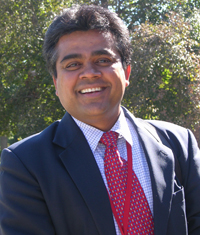 Type 1 diabetes strikes young and just keeps coming.
Type 1 diabetes strikes young and just keeps coming.
Each year, about 30,000 to 40,000 American children are diagnosed with Type 1 diabetes, which also is called juvenile or childhood diabetes. As these patients age, many of them will develop cardiovascular problems because of the lifelong diabetic barrage.
Such problems are the focus of Keshore Bidasee, Ph.D., associate professor in the department of pharmacology and experimental neuroscience.
 |
Keshore Bidasee, Ph.D. |
Individuals with Type 1 diabetes often experience the onset of cardiovascular problems about 30 years after they are diagnosed with diabetes. Heart failure, circulation issues and damage to other end organs and tissues like kidneys are among the problems Type 1 diabetes patients face as they get older.
As part of his research, Dr. Bidasee looks at the effects of a group of pro-oxidants called “reactive carbonal species,” which is produced in large quantities in patients with Type 1 diabetes and causes damage to proteins vital to the function of the cardiovascular system.
Dr. Bidasee looks at ways to reduce the levels of these pro-oxidant. In his research, he has found that Vitamin B6 seems to attack and scavenges these pro-oxidant, delaying the onset of heart failure.
“Taking Vitamin B6 is simple step patients can take to help reduce the effects of diabetes,” Dr. Bidasee said. “It’s a way patients can really take their care into their own hands.”
This is especially important since very recent studies suggest that elevated levels of these pro-oxidants can also cause cardiovascular disease in the non-diabetic general population.
|
|
“It really puts a great deal of stress on not only the patients, but the parents and the community around the patient as well,” Dr. Bidasee said.
For the past three years, he has received support for his research from the American Diabetes Association (ADA), an organization that receives support from the United Way.
“I simply would not be where I am in my research were it not for ADA support,” said Dr. Bidasee, who has used research done with his ADA grant to secure another much larger grant from the National Institutes of Health. “ADA has been invaluable to our research efforts.”